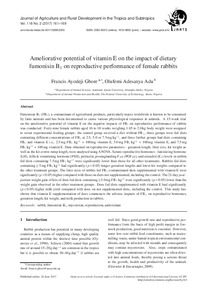Aufsatz

Ameliorative potential of vitamin E on the impact of dietary fumonisin B1 on reproductive performance of female rabbits
Zusammenfassung
Fumonisin B1 (FB1), a contaminant of agricultural products, particularly maize worldwide is known to be consumed by farm animals and has been documented to cause various physiological responses in animals. A 15-week trial on the ameliorative potential of vitamin E on the negative impacts of FB_1 on reproductive performance of rabbits was conducted. Forty-nine female rabbits aged 16 to 18 weeks weighing 1.65 to 2.0 kg body weight were assigned to seven experimental feeding groups: the control group received a diet without FB_1, three groups were fed diets containing different concentrations of FB_1 at 2.5, 5.0 or 7.5 mg kg^(−1), and three further groups had diets containing FB_1 and vitamin E i.e., 2.5 mg FB_1 kg^(−1) + 100 mg vitamin E, 5.0 mg FB_1 kg^(−1) + 100 mg vitamin E, and 7.5 mg FB_1 kg^(−1) + 100 mg vitamin E. Data obtained on reproductive parameters - gestation length, litter size, kit weight as well as the kit crown-rump length, were analysed using ANOVA. Serum reproductive hormones - luteinizing hormone (LH), follicle stimulating hormone (FSH), prolactin, prostaglanding F_2α (PGF_2α), and estradiol (E_2) levels in rabbits fed diets containing 7.5 mg FB_1 kg^(−1) were significantly lower than those for all other treatments. Rabbits fed diets containing >= 5 mg FB_1 kg^(−1) had significantly (p<0.05) longer gestation lengths and lower kit weights compared to the other treatment groups. The litter sizes of rabbits fed FB_1-contaminated diets supplemented with vitamin E were significantly (p<0.05) higher compared with those on diets not supplemented, including the control. The 21-day postpartum weight gain of kits of does fed diets containing >=5.0 mg FB_1 kg^(−1) were significantly (p<0.05) lower than the weight gain observed in the other treatment groups. Does fed diets supplemented with vitamin E had significantly (p<0.05) higher milk yield compared with does on not supplemented diets, including the control. This study has shown that vitamin E supplementation of does counteracts the adverse impacts of FB 1 on reproductive hormones, gestation length, kit weight, and milk production in rabbits.
Zitierform
In: Journal of Agriculture and Rural Development in the Tropics and Subtropics. Kassel : Kassel University Press. - Vol. 118, No. 2 (2017) S. 161-169Sammlung(en)
Vol 118, No 2 (2017) (Journal of Agriculture and Rural Development in the Tropics and Subtropics (JARTS))Zitieren
@article{urn:nbn:de:hebis:34-2017032852303,
author={Gbore, Francis Ayodeji and Adu, Olufemi Adesanya},
title={Ameliorative potential of vitamin E on the impact of dietary fumonisin B1 on reproductive performance of female rabbits},
year={2017}
}
0500 Oax 0501 Text $btxt$2rdacontent 0502 Computermedien $bc$2rdacarrier 1100 2017$n2017 1500 1/eng 2050 ##0##urn:nbn:de:hebis:34-2017032852303 3000 Gbore, Francis Ayodeji 3010 Adu, Olufemi Adesanya 4000 Ameliorative potential of vitamin E on the impact of dietary fumonisin B1 on reproductive performance of female rabbits / Gbore, Francis Ayodeji 4030 4060 Online-Ressource 4085 ##0##=u http://nbn-resolving.de/urn:nbn:de:hebis:34-2017032852303=x R 4204 \$dAufsatz 4170 7136 ##0##urn:nbn:de:hebis:34-2017032852303
<resource xsi:schemaLocation="http://datacite.org/schema/kernel-2.2 http://schema.datacite.org/meta/kernel-2.2/metadata.xsd"> 2017-06-27T11:55:56Z 2017-06-27T11:55:56Z 2017-06-26 1612-9830 2363-6033 urn:nbn:de:hebis:34-2017032852303 http://hdl.handle.net/123456789/2017032852303 eng Kassel University Press Urheberrechtlich geschützt https://rightsstatements.org/page/InC/1.0/ rabbit fumonisin B1 mycotoxin reproduction antioxidant 630 Ameliorative potential of vitamin E on the impact of dietary fumonisin B1 on reproductive performance of female rabbits Aufsatz Fumonisin B1 (FB1), a contaminant of agricultural products, particularly maize worldwide is known to be consumed by farm animals and has been documented to cause various physiological responses in animals. A 15-week trial on the ameliorative potential of vitamin E on the negative impacts of FB_1 on reproductive performance of rabbits was conducted. Forty-nine female rabbits aged 16 to 18 weeks weighing 1.65 to 2.0 kg body weight were assigned to seven experimental feeding groups: the control group received a diet without FB_1, three groups were fed diets containing different concentrations of FB_1 at 2.5, 5.0 or 7.5 mg kg^(−1), and three further groups had diets containing FB_1 and vitamin E i.e., 2.5 mg FB_1 kg^(−1) + 100 mg vitamin E, 5.0 mg FB_1 kg^(−1) + 100 mg vitamin E, and 7.5 mg FB_1 kg^(−1) + 100 mg vitamin E. Data obtained on reproductive parameters - gestation length, litter size, kit weight as well as the kit crown-rump length, were analysed using ANOVA. Serum reproductive hormones - luteinizing hormone (LH), follicle stimulating hormone (FSH), prolactin, prostaglanding F_2α (PGF_2α), and estradiol (E_2) levels in rabbits fed diets containing 7.5 mg FB_1 kg^(−1) were significantly lower than those for all other treatments. Rabbits fed diets containing >= 5 mg FB_1 kg^(−1) had significantly (p<0.05) longer gestation lengths and lower kit weights compared to the other treatment groups. The litter sizes of rabbits fed FB_1-contaminated diets supplemented with vitamin E were significantly (p<0.05) higher compared with those on diets not supplemented, including the control. The 21-day postpartum weight gain of kits of does fed diets containing >=5.0 mg FB_1 kg^(−1) were significantly (p<0.05) lower than the weight gain observed in the other treatment groups. Does fed diets supplemented with vitamin E had significantly (p<0.05) higher milk yield compared with does on not supplemented diets, including the control. This study has shown that vitamin E supplementation of does counteracts the adverse impacts of FB 1 on reproductive hormones, gestation length, kit weight, and milk production in rabbits. open access In: Journal of Agriculture and Rural Development in the Tropics and Subtropics. Kassel : Kassel University Press. - Vol. 118, No. 2 (2017) S. 161-169 Gbore, Francis Ayodeji Adu, Olufemi Adesanya Gedruckte Ausg. im Verlag Kassel Univ. Press (www.upress.uni-kassel.de) erschienen. </resource>
Die folgenden Lizenzbestimmungen sind mit dieser Ressource verbunden:
Urheberrechtlich geschützt

